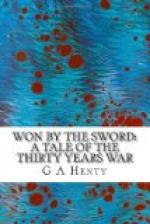“Yes, sir, he has ridden behind me each time that I have been away since I engaged him. When I say behind me, he starts behind me, but when out of town I call him up beside me, and we talk, or rather try to talk, in Italian — or rather I should say in Piedmontese, for he tells me that each district of Italy has its own dialect, and that the natives of one can scarce understand the other. I have bought a book printed here and a dictionary, and of an evening when I have no duties to perform he comes into my room, and translates sentence by sentence as I read it to him. I learn it by heart, and hope that ere long I shall be able to make myself understood in it.”
“You do well — very well,” the viscount said. “If all my young officers were to do the same, instead of spending the evening and half the night in drinking and gambling, things would go on much more smoothly, and there would not be so many blunders in carrying out my orders. You will greatly add to your usefulness by acquiring a knowledge of the language, and it would certainly enable you to carry out with far less danger such commissions as those you were just speaking of; for you might be asked a question, and if it were replied to by your lackey, suspicions would be at once aroused. You have ridden along this road before?”
“Several times, sir.”
“Have you noted the features of the country — I mean from a military point of view?”
“I have nothing else to do as I ride along, sir. As I go I notice where an ambuscade might be laid, either by ourselves or an enemy, where we might expect to be opposed on our march forward, or where a rear guard might check an enemy were we retiring before him.”
“Good! the fate of a battle depends in nine cases out of ten upon a knowledge of the ground, and in quickness in utilizing that knowledge. Our journey today is only taken for that purpose. I want to see for myself the country across which we shall at first operate, to inspect the various routes by which we might advance, or through which, if we find the enemy in too great a force to be encountered, we should be obliged to retire. As we go you shall point out to me the observations that you have made, and I shall be able to judge whether the spots are well chosen for the purpose.”
CHAPTER III: THE FIRST BATTLE
During the three days that were spent in reconnoitering the country Hector Campbell learnt more than he would have done in as many years under ordinary circumstances. Turenne took the greatest pains to point out to him how the nature of the ground could be taken advantage of, how flanks could be protected against attack by comparatively small bodies, occupying positions from which they could be with difficulty expelled; how important was the action of guns, especially when so placed as to be able to sweep the ground across which an enemy must advance in any endeavour to turn the position of an army. Turenne, on his part, took pleasure in instructing a pupil who was at once so eager to learn, and who showed himself so apt in profiting by his teaching.




